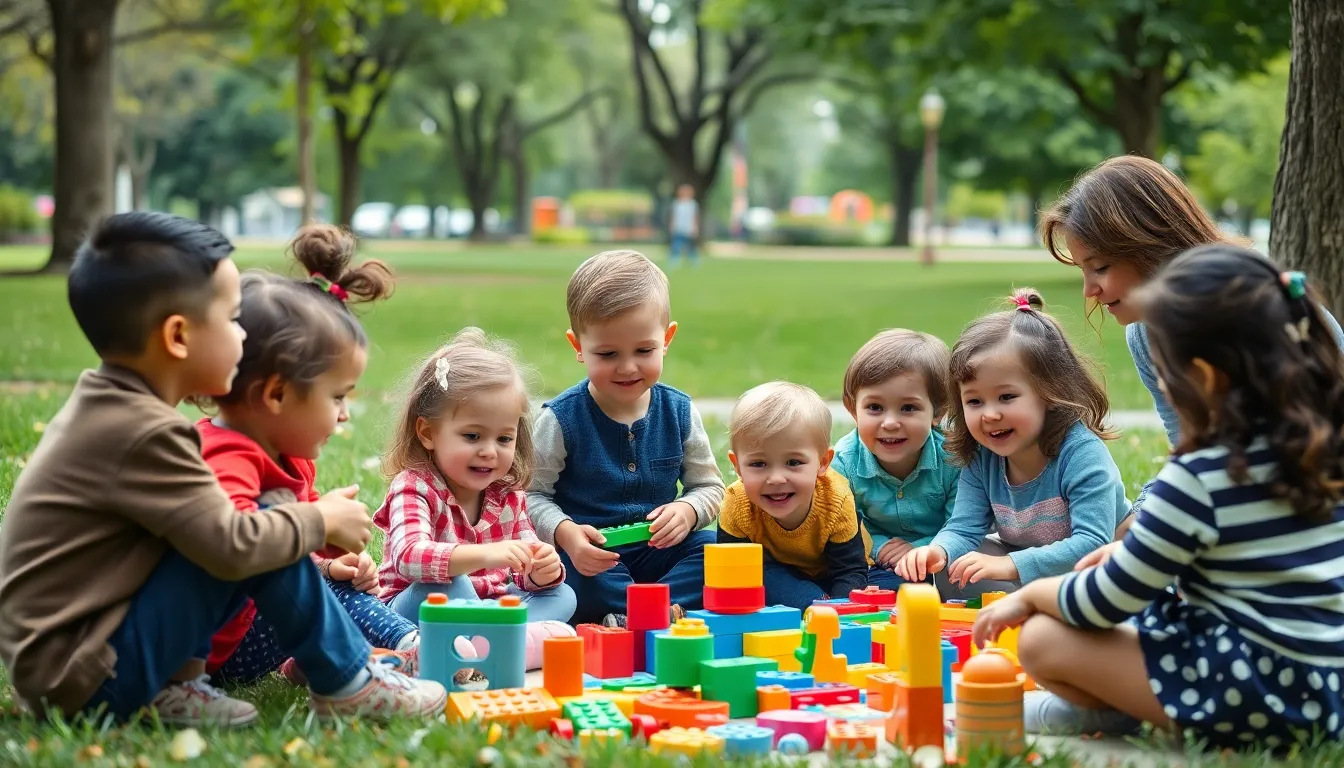In a world where parenting often feels like a high-stakes game of dodgeball, understanding child and family development can be your secret weapon. It’s not just about keeping the kids alive and the house relatively clean; it’s about nurturing well-rounded individuals who can thrive in this crazy world. Whether you’re navigating tantrums or tackling teenage angst, knowing the ins and outs of development can make all the difference.
Imagine transforming those chaotic dinner table debates into insightful discussions that actually lead to growth. By exploring the stages of child development and the family dynamics at play, parents can unlock the secrets to fostering resilience, empathy, and independence. So buckle up and get ready to dive into the fascinating journey of child and family development—because who wouldn’t want to turn their home into a nurturing haven instead of a battleground?
Table of Contents
ToggleOverview of Child and Family Development
Understanding child and family development encompasses various stages and dynamics that impact growth. Child development includes physical, emotional, social, and cognitive aspects. Each stage contributes to a child’s ability to interact with the world. Infancy, early childhood, middle childhood, and adolescence represent key developmental phases.
Family dynamics play a vital role in this context. Supportive environments foster strong relationships. Parents who engage with their children promote both confidence and resilience. Open communication encourages emotional intelligence, allowing children to express their feelings and thoughts effectively.
Specific developmental milestones exist for each age group. For example, infants typically begin to recognize faces and respond to familiar voices. During early childhood, imaginative play becomes essential for social skills. In middle childhood, children develop stronger reasoning abilities and friendship skills. Adolescents focus on identity formation and autonomy.
The interplay between child and family development shapes well-rounded individuals. Parenting approaches directly influence a child’s self-esteem and social competence. Research indicates that children who feel secure in their family relationships exhibit better academic performance and emotional health.
Creating a nurturing environment requires ongoing effort. Parents can utilize strategies like positive reinforcement and active listening to enhance family interactions. By prioritizing emotional support and guidance, families can cultivate an atmosphere conducive to thriving.
Child and family development involves understanding key stages, fostering supportive dynamics, and actively nurturing growth.
Key Theories in Child Development

Understanding key theories in child development provides insight into how children grow and learn. These theories highlight vital aspects of the child-parent relationship.
Attachment Theory
Attachment theory emphasizes the emotional bonds formed between children and caregivers. Secure attachments often lead to healthier emotional and social development. Children who develop secure attachments tend to seek comfort, which fosters exploration and learning. According to attachment theory, responsive caregivers enhance a child’s sense of safety and self-worth. Early experiences with attachment influence future relationships and coping mechanisms. Studies show that securely attached children exhibit better emotional regulation and interpersonal skills. This theory underlines the importance of nurturing environments in promoting healthy development.
Cognitive Development Theory
Cognitive development theory focuses on how children think and understand the world. Pioneered by Jean Piaget, this theory outlines stages of intellectual growth throughout childhood. Children progress through distinct stages, including sensorimotor, preoperational, concrete operational, and formal operational. Each stage represents a shift in cognitive abilities, affecting problem-solving and reasoning skills. For instance, younger children may struggle with abstract concepts, while older ones can grasp complex ideas. Research supports that engaging in stimulating activities enhances cognitive development. This theory highlights the importance of active learning experiences in fostering intellectual growth.
Family Dynamics and Their Impact
Family dynamics significantly shape a child’s development. Understanding these dynamics reveals how family interactions impact emotional and social growth.
Parenting Styles
Authoritative parenting promotes independent thinking and self-regulation in children. Research shows that this style fosters high self-esteem and academic performance. Permissive parenting, however, often results in children struggling with boundaries and authority. It may lead to impulsive behavior and poor academic achievement. On the other hand, authoritarian parenting emphasizes discipline but can hinder a child’s social skills and self-expression. Each style influences a child’s approach to relationships and problem-solving, emphasizing the need for parents to reflect on their strategies.
Socioeconomic Factors
Socioeconomic factors play a crucial role in family dynamics and child development outcomes. Families with higher income levels typically access better educational resources and healthcare. Children from these households often experience fewer stressors, promoting healthy emotional growth. Conversely, families facing economic hardships face challenges like limited access to quality education and healthcare. These factors can hinder a child’s cognitive and social development. Parental stress from financial instability may also affect family interactions, impacting children’s emotional well-being. Acknowledging these socioeconomic influences is essential for understanding developmental disparities among children.
Stages of Child Development
Understanding the stages of child development is crucial for parents. Each stage contributes uniquely to a child’s growth and capabilities.
Infancy
Infancy encompasses the first year of life. Significant physical milestones, such as rolling over and sitting up, occur during this period. Emotional bonds formed between caregivers and infants lay the groundwork for future relationships. Infants explore their surroundings, guided by sensory experiences, which enhance cognitive development. Researchers note that stimulating environments, including interaction and play, significantly impact brain growth.
Early Childhood
Early childhood spans ages one to five. This stage witnesses rapid growth in language and social skills. Children often develop autonomy through activities like potty training and simple decision-making. Play becomes essential for learning, allowing children to explore emotions and interact with peers. Research shows that support in this phase fosters self-esteem and social competence. Engaging activities help sharpen fine motor skills, preparing children for later educational opportunities.
Middle Childhood
Middle childhood occurs between ages six and twelve. During this stage, cognitive abilities expand, enabling complex problem-solving and critical thinking. Relationships with peers often become more significant, influencing social dynamics and emotional stability. Academic skills gain emphasis as children start to grasp more advanced concepts in school. Developing self-regulation becomes crucial for managing behaviors and emotions effectively. Families can nurture these skills through encouragement and structured activities.
The Role of Education in Development
Education plays a vital role in shaping children’s development and facilitating family growth. It lays the foundation for lifelong learning and equips children with essential skills.
Early Childhood Education
Early childhood education significantly influences cognitive and social development. This phase, typically spanning ages three to five, focuses on learning through play. Engaging activities foster language development, critical thinking, and self-regulation skills. Studies indicate that children enrolled in high-quality early education programs demonstrate better academic performance later in life. They develop strong foundational skills that enhance their abilities to adapt in dynamic environments.
Family Involvement in Schools
Family involvement in schools greatly enhances children’s educational experiences. Active participation in school events, such as parent-teacher conferences and volunteer opportunities, strengthens the home-school connection. Research shows that children whose families engage in their education exhibit improved behavior and academic outcomes. When parents show interest in their child’s schoolwork, students feel more supported and motivated to succeed. Building partnerships between families and schools fosters a collaborative atmosphere that benefits children’s overall development.
Understanding child and family development is essential for fostering a nurturing environment. By recognizing the stages of growth and the dynamics within the family, parents can create supportive relationships that empower children. This journey requires commitment and active engagement but leads to well-rounded individuals who thrive emotionally and socially.
Investing time in positive interactions and education not only enhances children’s skills but also strengthens family bonds. As families prioritize emotional support and effective communication, they pave the way for resilience and independence in their children. Embracing these principles can transform parenting into a rewarding experience that benefits everyone involved.




